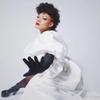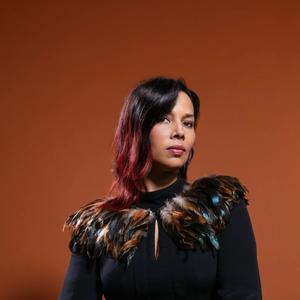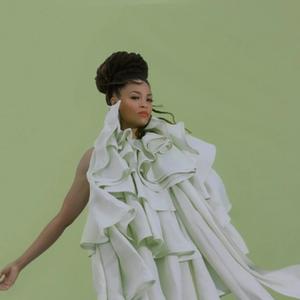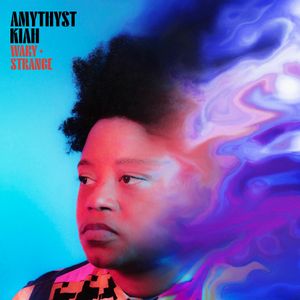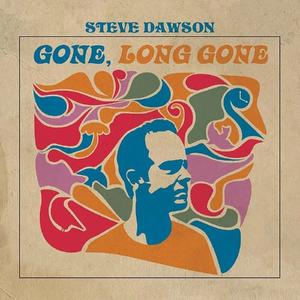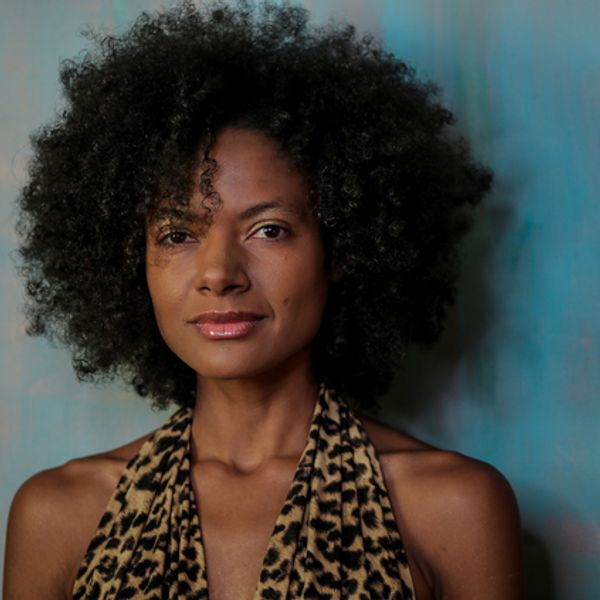




Link copied

Allison Russell is a Montreal-born, banjo and clarinet-playing singer-songwriter who epitomises what Americana is and certainly can be. She’s also a survivor who, through her debut solo album Outside Child, is exploring the rawness of her past while finding a “roadmap out” of her own childhood. In her own words, she has been rescued by art and music – alongside her life-partner JT, with whom she shares the group Birds of Chicago, and their 7-year-old daughter, Ida.
Written almost entirely in a three-month period, Outside Child is musically warm, organic and utterly gorgeous. Yet lyrically, it’s an intensely personal album that Russell felt compelled to make as part of her journey away from 15 years of abuse. “I needed to step into my own story in my own name because that was the thing that terrified me the most. I needed to do that because I’m a mom now - if I can’t face these things and lay them to rest, then I run the risk of my daughter having to carry forward some of that trauma. I need to show her some bravery and some fearlessness.”
The early seeds of the album came to Russell while out on an “absolutely wild” tour in 2019 with Our Native Daughters – the Roots supergroup she formed alongside Rhiannon Giddens, Amythyst Kiah and Leyla McCalla. While trying to sleep alongside her daughter Ida in a tiny bunk on the tour bus, the track ‘Fourth Day Prayer’ almost wrote itself. “When I was a teen, people would say things like “these are the best years of your life”, and I was living in a complete nightmare at that time”.
As the line popped into her head, so the verses followed; before long all of the other songs started to force their way through. Once she’d started writing on the bus, she knew it was her own story she had to tell. “I had to give myself the same kind of love and care that I would give to any protagonist. It almost gave me a layer of separation in that way, to be the narrator and the hero of my own tale.” Of course, it was cathartic and painful for Russell, as she wrote about specific periods from her past. But this time, she says, “I wasn’t alone, I had JT at my back ready to slay the dragons that got by me.”
Along with her understandable excitement about this new record, Russell is most hyped up about an imminent move to East Nashville, where she hopes to be closer to her “chosen sister” Yola, who duets on album highlight ‘The Runner’ and with whom she weathered the pandemic. “We’ve managed to find a place a few blocks away, so we won’t have total separation anxiety. We’ll get to walk to each other’s houses”.
Russell found picking six albums for Cuts The Deepest a terribly tough task. She gets tips for new discoveries from music journalists and friends – and subscribes to two streamers. “It’s like a jumping-off point, then I’ll buy the vinyl of that artist. The algorithm has sucked me in and spat out some real gems.” But in this moment, she selects her earliest and most formational records. What’s particularly special about Russell’s choices and the stories behind them, is how they relate directly to the autobiographical nature of her own new record. Having dealt with such trauma and abuse growing up, music and writing have been a vehicle for her to make sense of it and find her way out. Each of her choices tell part of that story.

Stevie Wonder - Songs in the Key of Life
This huge, double album was so foundational to my understanding of what music can explore. He’s a master of being able to talk about hard things and make them sound happy. You’re just bopping along, then you’re devastated. It changed how people think about music. All the tracks are brilliant, but that first song, ‘Love’s In Need Of Love Today’, I’ve been thinking about non-stop for the last four years in this country. Empathy was mocked, and behaviour that I’d be ashamed of my daughter engaging in in the school ground was upheld as somehow virtuous. So that song’s been in my head all this time. Also hearing his daughter’s voice on ‘Isn’t She lovely?’, the sweetness of the melody and that chromatic harp - there’s not a bad song on that record.
Joni Mitchell - Ladies of the Canyon
That record is so enchanting, and I don’t even think it’s her best record. It has this formational place in my heart and imagination - the first time I heard clarinet was on the song ‘For Free’, which I love. That was hearing my instrumental love for the first time; hearing the clarinet led me to Sidney Bechet and Benny Goodman. She’s Canadian too, from Saskatchewan, just like my mom! Canada has the combination of that intense, same kind of melting pot that there is in America, but there’s also this vastness of space and deadly quality of the environment where we will literally die if we are trapped outside in the winter!
There’s so much history between Canada and Scotland, where my mum is from. She’s Scottish Canadian; her grandpa and great uncle fought in the First World War, at the Somme. There are such close ties. Every time I come to the UK, and particularly Scotland, I feel close to my grandma. Even though she spent most of her life in Canada, Scotland was in her heart still. Her dad was an orphan and got shunted around all kinds of places; they lied about their ages to get on the boat to come to Canada when they were giving out land grants in the west. Thinking about that is so painful, the kind of disenfranchisement that was happening to Scottish people – being booted off their land that they’d been on forever. At the same time, disenfranchisement was happening for indigenous people in the west of Canada. Bringing folk from Europe and settling them as if it was uninhabited land, these traumas on two continents, the collision of two cultures; the music comes out of that. North American so-called “roots music” have their origins in these stories. The black diaspora coming and being foundational is devastating, yet all of this music comes out of this collision of cultures, loss of homeland, language and people. I think a lot about those layers of losses intermingling to create this music that has changed the world.
Tracy Chapman - Tracy Chapman
Oh, this record! I listened to Stevie Wonder and Joni Mitchell with my mum on weekend visits from the foster home, then while I was in foster care she married this American ex-pat who adopted me and became my primary abuser for a decade. He was a violent, controlling, sick man – and very controlling around music as well. He would not allow us to listen to any modern music in the house – anything written after 1850 or so. It was a very clandestine thing to listen to music, and when I was nine I went on my first trip away from him, to my maternal uncle David, who became a surrogate father figure. He and his wife Barb helped me understand that adults can be loving. I went on a road trip with them to Alberta, driving through the Rockies, back in the days of tape decks in the car, and he played me Tracy Chapman. I remember hearing ‘Behind The Wall’ and just coming undone, sobbing into my neon pink shirt on the window. I was nine and we were like the family “behind the wall”. Her timeless, empathetic voice singing that song was revelatory – and that set me on the beginning of the path that you can write about the things that hurt you.
‘Fast Car’ is one of the greatest songs ever written. It’s interesting that black women writers are not lauded as the poets that they are. People say she’s a blues singer, but she’s much more. The breadth of her writing is astonishing and that’s something that doesn’t get talked about - what a poet she is, how masterful. She’s so influential.
Nina Simone: Verve Jazz Masters 17
This was my introduction to Nina Simone. When I was 17 I moved across the country to live with my Uncle David and Aunt Barb for a while. They had an incredible record collection and I remember becoming obsessed with this. I’d never heard her before - I just played that record over and over again. Then I started to learn more about her – she did not have an easy life – and I related so deeply to her and the struggles she went through. It’s a hugely important record, and it’s got ‘Black Is The Colour Of My True Love’s Hair’. It’s also got her version of ‘Strange Fruit’ that lays you out and you don’t get up for a day. ‘I Put A Spell On You’ is here, and the way she does ‘See-Line Woman’ is like nobody else. She makes it so fierce and you feel the layers of pain and oppression. You feel everything in that song. And there’s ‘Mississippi Goddamn’ live at Carnegie Hall. When I heard this, it was like, “Woo, what is happening?”
It’s an incredible compilation and spans the breadth of what she could do. One minute you’re in this folk world, then she brings in a baroque melody on the piano, then she devastates you with the rawness of her vocal. That was revelatory to me; I had been so steeped in classical music because of my adoptive father. So to hear her turning and twisting it to her own ends and not being in awe of these dead German composers; she wasn’t like: these are the pinnacle and it can never be touched, all I can do is reproduce it. She was taking what she wanted and mixing and blending it unapologetically with other sounds.
That was really influential to the way that I think about – or rather don’t think about – genre in music. I don’t think that’s how music works. That’s how some salesmen back in the day decided they needed to sell furniture, and decided on race records and hillbilly records to divide it along colour lines. Sometimes they would have the same black artist playing on both records, but one was marketed as a blues or race record for the black community, and one was marketed as good old boy hillbilly music for the white community. Those were the names, the first genres, and unfortunately, there’s that segregated, bigoted thinking at the root of most genres, even though we don’t realise that’s what we’ve inherited. Why is some music considered urban, why isn’t Tina Turner considered one of the greatest country singers of all time, why isn’t Ray Charles? It’s because country got whitewashed!
Lucinda Williams - Car Wheels On A Gravel Road
That record is from my early days driving around with Po’ Girl [Russell’s previous band]. Lucinda Williams is one of the modern poets I fell in love with, and that was also my first experience of considering the album as a complete journey and how autobiographical it is. I also noticed how she is an “outsider” narrator; even that song ‘Car Wheels On A Gravel Road’, that’s not a picture of an easy childhood; you can smell the car, hear her mother’s voice and literally hear the car wheels on the gravel road. It’s a short story in a song – and short stories are much more difficult to write. That’s one of the hardest mediums and she does it with a melody you never forget and her perfect drawl of a voice. She’s brilliant, this was the first album I lived inside of and escaped into in the way I would a novel. I hope I bump into her one day. I wouldn’t go up and bother her, that’s an unwritten rule in Nashville, it’s understood that you leave people alone.
K’Naan: The Dusty Foot Philosopher
This is a total departure but one of my all-time favourites, the breakout record by Somali Canadian artist K’Naan. I first heard this in 2005, live at a tiny festival in Northern Alberta called the North Country Fair. His band, a band from Chad called H’Sao and I were the only black people for miles around, and people were very kind, but we were making jokes about “you run that way and I’ll run this way and they won’t be able to catch us all!” I still have that feeling of hearing his voice coming across the compound, and we were completely immersed. I still go back to that record and its layers of bravery and self-determination. I remember him saying to the crowd: “I’m a black Muslim refugee, imagine how many strikes they’ve got lined up against me.” Here we were in Northern Alberta; we stick out like sore thumbs in a sea of white faces, and people have very different experiences, and there wasn’t a dry eye. It was so moving.
He’s made bigger records that have more acclaim, but to me, that first record is a life statement that can’t be duplicated and lives in a special place in my heart. It also helped me start to envision that notion of being the hero of your own songs. He really does that in this record, this child of war from an immigrant family who grew up in poverty, experiencing intense discrimination and being told a story of his own worthlessness, which was not true. It’s a story he grew up hearing that he turned into high art. That touched me and planted a seed. And even though sonically it couldn’t be more different, there’s a direct line from The Dusty Bare Foot Philosopher to Outside Child.
Allison Russell's debut solo album, Outside Child, is out today (21/5) via Fantasy Records. Watch the video for her single 'Nightflyer' below.

